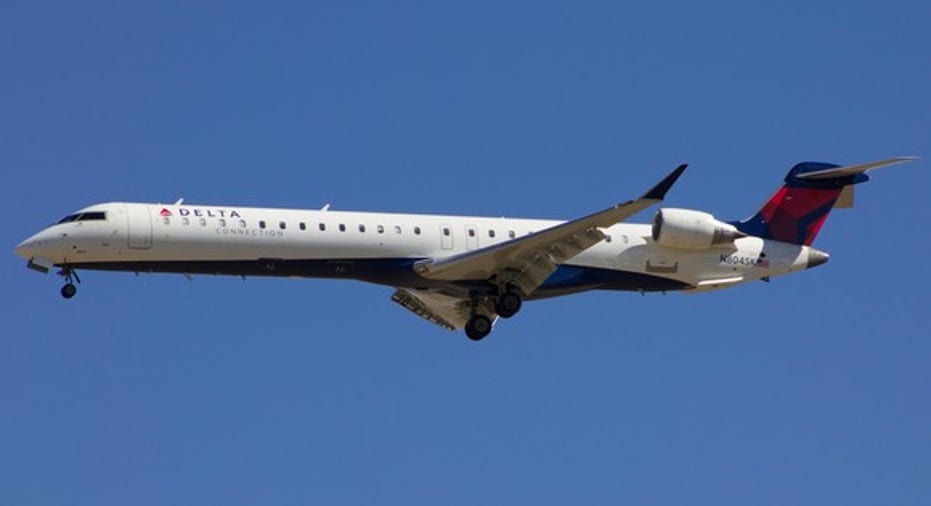Could New Regional Jets Help Break the Pilot Contract Logjam at Delta Air Lines?

For more than a year, Delta Air Lines (NYSE: DAL) has faced growing discontent among its pilots. Delta reached a tentative new contract agreement with its pilot union in June 2015 that would have raised pilot base wages 21.5% over the course of three years.
However, the tentative agreement was rejected by a 65%-35% margin. Aside from wanting bigger raises, many pilots were unhappy about changes to Delta's profit sharing and sick leave policies that were included in the new contract. Since then, management-labor tensions have remained high.
Delta and its pilots have sparred over rival contract proposals this year. Image source: The Motley Fool.
Earlier this month, Delta's management laid out a fresh proposal that could form the groundwork for a new pilot contract. Unfortunately, the carrier's desire to add more outsourced flying of 70-76 seat regional jets could prove to be a non-starter among the pilots.
Inching closer
Delta isn't the only airline facing labor unrest these days. Pilots want to get a share of the industry's rising profitability, while airline executives are wary of agreeing to terms that would prove unsustainable in an industry downturn.
Still, airline management teams are starting to loosen their purse strings, recognizing that wage increases are inevitable when the industry is earning record profits. On the flip side, pilots are starting to realize that their window of opportunity may not last forever. Steep unit revenue declines are threatening to crimp profits at many large airlines.
Thus, Southwest Airlines (NYSE: LUV) reached a tentative agreement with its pilots last month after years of negotiations. Southwest's pilots will receive 15% raises effective Oct. 1 followed by 3% annual raises for the next four years. By contrast, the Southwest Airlines Pilots' Association had been asking for an immediate 18% raise and 4% annual raises thereafter.
The Delta contract negotiations also seem to be making progress. As of last week, Delta was offering 27% raises over four years while the union was holding out for raises of 31% over three years. That's still a meaningful gap, but the two sides are a lot closer than they were six months ago.
Delta revives an old strategy
Delta had much less trouble negotiating its previous pilot contract. In 2012, the two sides quickly reached an agreement that raised pilot pay nearly 20% over the course of three years.
A key aspect of the 2012 contract was that it called for Delta to acquire a fleet of small mainline jets from Southwest Airlines. This created new career advancement opportunities for Delta pilots. The trade-off was that Delta was allowed to expand its use of 70-76 seat jets flown by regional airlines. Together, these contract changes enabled Delta to retire most of its aging, inefficient 50-seat regional jets.
However, Delta still has about 125 50-seat jets. And while low fuel prices have made it more viable to continue flying these planes, rising maintenance costs and poor customer satisfaction scores remain big headwinds.
Thus, Delta Air Lines wants permission from the pilot union to add up to 50 additional large regional jets with 70-76 seats in the coming years. This -- along with a recent order for the 100-110 seat Bombardier CS100 jet -- would allow Delta to retire most of its remaining 50-seat jets.
Delta wants to expand its fleet of 76-seat regional jets again. Image source: The Motley Fool.
In theory, the additional profit Delta would earn from substituting large regional jets for its aging 50-seaters would allow the carrier to offer bigger raises for its pilots. That could get the two sides close enough to hammer out a deal.
Don't count on success
Letting Delta expand its fleet of large regional jets wouldn't cost its mainline pilots much. A decade ago, legacy carriers were laying off mainline pilots in favor of outsourcing agreements with regional airlines. Today, the growing U.S. pilot shortage ensures that pilots' jobs are secure and opportunities for advancement will be numerous.
Unfortunately, given the history of major airlines outsourcing jobs, many pilots may see allowing Delta to use more large regional jets as a major concession.
Furthermore, while there are some parallels to the agreement reached in 2012 -- Delta would add small mainline jets to its fleet at the same time as it brought in more large regional jets -- in this case Delta is under contract to add the CSeries jets regardless of what happens with its regional fleet. Thus, the airline has less bargaining leverage.
Hopefully, for the good of all stakeholders, Delta's management and its pilots can find a workable compromise sooner rather than later.
A secret billion-dollar stock opportunity The world's biggest tech company forgot to show you something, but a few Wall Street analysts and the Fool didn't miss a beat: There's a small company that's powering their brand-new gadgets and the coming revolution in technology. And we think its stock price has nearly unlimited room to run for early in-the-know investors! To be one of them, just click here.
Adam Levine-Weinberg is long January 2017 $40 calls on Delta Air Lines. The Motley Fool has no position in any of the stocks mentioned. Try any of our Foolish newsletter services free for 30 days. We Fools may not all hold the same opinions, but we all believe that considering a diverse range of insights makes us better investors. The Motley Fool has a disclosure policy.



















